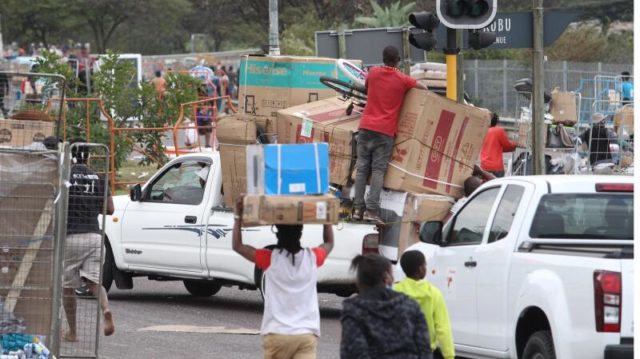The week-long July unrest claimed the lives of over 340 people and cost the economy R50 billion in productivity.
DURBAN – A high-level panel report detailing the impact of the July unrest that engulfed much of KwaZulu-Natal and Gauteng last year found that poverty and unemployment were among the factors that exacerbated the rioting and looting.
The week-long July unrest claimed the lives of over 340 people and cost the economy R50 billion in productivity.
On August 5, 2021, President Cyril Ramaphosa appointed an expert panel, chaired by Professor Sandy Africa, to investigate the preparedness of the government or lack thereof in the aftermath of the unrest. The panel found that among others, the weakness of state institutions, poverty, the incessant job crises, and the imprisonment of former president Zuma, were some of the main drivers of the looting of businesses. The report found that some of the visitations to business properties were not random, but planned out in detail.
“The violence that broke out in July 2021 can be viewed in the context of multiple crises and challenges facing South Africa, key among them being, the weakness of state institutions, a phenomenon referred to as the hollowing out of state institutions, high unemployment, with no continuous plan to address this challenge, inherited high levels of poverty and deep inequality, poor spatial planning, leading to overcrowded and unsuitable living conditions for many, with informal settlements emerging in crowded urban spaces as people move to the cities in search of opportunities, rampant corruption at various levels of government and the phenomenon of sponsored State Capture.
“We find that poorly rolled out service delivery and unacceptable living conditions, the state of the economy, and persistent levels of poverty served to provide the ripe environment to light the tinder box that was the incarceration of former president Zuma that led to many poor and desperate people joining in the looting, alongside those more calculating in their objectives and motivation.
“The submissions we received point to elements of the organisation behind the looting of the malls, combined with opportunistic looting. We also received submissions that some of the attacks were planned in hostels. It is clear that the planners wanted the looting to look like they were spontaneous; ‘organised spontaneity’,” the report said.
The report also found that in some communities the response in some instances uncovered existing racial prejudices. Police said at least 36 people were killed in the mostly Indian town of Phoenix.
“Responses to the violence in some communities exposed deep-seated racial prejudices and tension indicating there is much to be done to achieve racial justice and greater social cohesion.”
The 154-page long report found that there was no clear line of communication between law enforcement agencies and the president in his capacity as National Security Council (NSC) chairperson.
“It is not clear whether the ministers, in particular of Police, Defence and State Security received authorisation for their actions and interventions from the president. They informed us that they took their own initiatives once the violence broke out, such as travelling to KZN and setting up operation centres there.”
The panel said the president asked it to determine whether the response by the security services was timeous, appropriate, and sufficient, to which it concluded: “unequivocally no”.
Reacting to the pane’s findings, DA leader John Steenhuisen, called for the removal of ministers Ayanda Dlodlo and Bheki Cele from the Cabinet.
“At the very least, Police Minister Cele and Intelligence Minister Dlodlo must be dropped from the Cabinet immediately and entirely. In a functional democracy, their heads would have rolled long ago. Instead, President Ramaphosa retained Cele despite the paralysis in the SAPS and redeployed Dlodlo to a key position. Second, this report contains more than enough evidence why an independent, credible and accountable state security apparatus is essential.
“The State Security Agency must be removed from the Presidency and reformed as per the recommendations of the 2018 High-Level Review Panel report which has mostly been collecting dust.”
Daily News







